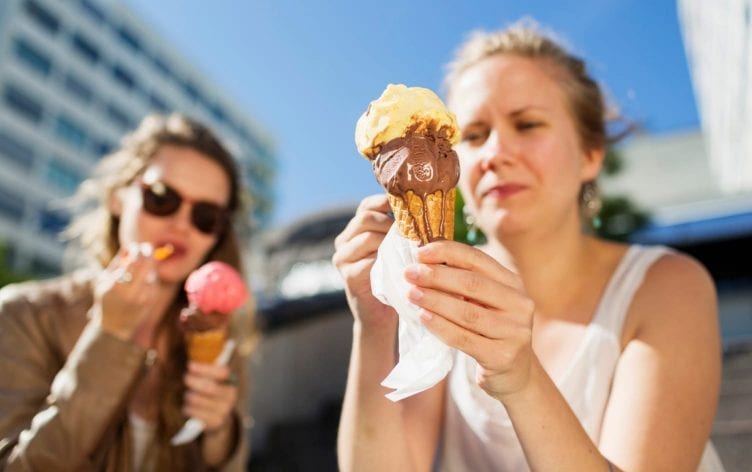
It may seem like a Catch 22: The more you want to lose weight, the harder you try, then the more pressure you put on yourself only to feel discouraged and not see results and then potentially give up. What isn’t normal about that? However, when you’re trying to create better eating habits to lose weight, you’ll be more successful if you have a healthy attitude toward food, rather than a guilty conscience. Food guilt can prompt you to feel helpless and out of control, which may make your weight-loss efforts backfire.
“You should never feel guilty about eating any food,” says Rahaf Al Bochi, RD, a spokesperson for the Academy of Nutrition and Dietetics and owner of Olive Tree Nutrition. “There is no such thing as ‘helpful’ food guilt. Any type of food guilt is harmful to mental health and can keep you trapped in the cycle of yo-yo dieting.”
Here, a look at the reasons behind food guilt, why your perspective on food matters and — most important — how to foster a positive mindset toward food:
WHY DOES FOOD GUILT OCCUR
Guilty feelings about food are common among people who regularly restrict what they eat.
“Over time, you will have feelings of deprivation, and the food that is restricted will continually occupy your mind,” says Al Bochi. This likely leads to a time “when you give in and you end up eating the food that you were restricting. It usually ends up in binge eating and subsequently feeling guilty. People on diets think that they have no willpower or that they failed, but in reality, it’s the diet that failed them. Binge eating is a natural response to food restriction.”
WHY ATTITUDE MATTERS
Your attitude toward food is important: Some research has found food guilt is stronger among people who perceive they have overeaten, even if they haven’t. Other research has examined the associations people make in their minds for indulgent foods like chocolate cake — Do you find it celebratory? Does it make you feel guilty? — and found people in high-stress situations who associate chocolate cake with guilty feelings are more likely to have unhealthy eating habits, negative attitudes toward healthy eating and lower levels of food-related self-control during stressful situations. These guilty feelings may cause people to eat more than they would want to in higher-stress situations.
HOW TO HAVE A POSITIVE MINDSET WITH FOOD
If you experience food guilt, especially in high-stress situations, try these ideas to change your mindset toward food, which may help with your weight-loss goals:
VIEW FOODS AS NEUTRAL
If you’re more likely to associate chocolate cake with guilt than celebration, then you probably also consider some foods (like fruits and vegetables) to be “good” and other foods (like chips and sweets) to be “bad.” For some people, this traces back to childhood; you may have learned it from your parents and internalized the message before forming your own opinions. Labeling foods this way can lead to negative thoughts about yourself, if you eat things you think you shouldn’t.
“When you eat ‘bad’ foods, you end up feeling guilty about eating them,” says Al Bochi. “In reality, food has no moral value. All foods should be viewed as neutral. Redefine what healthy means to you. Try to view foods as neutral and give yourself full permission to enjoy all foods in moderation.”
FIND OTHER WAYS TO RELIVE STRESS
Some people use food as a coping mechanism when they’re stressed, and when they eat too much in those situations, they feel guilty about it. “Using food as a coping mechanism is problematic when it is your sole strategy to relieve stress,” Al Bochi says. “Having a list of non-food strategies to relieve stress can be very helpful in these situations.” Consider calling a friend, going for a walk or journaling to help yourself calm down after experiencing something stressful or upsetting.
DECIDE YOUR INTENTIONS AHEAD OF TIME
Some research shows when you choose what to do in response to a stressful food situation before you experience that moment, you’ll be less likely to succumb to temptation. This may reduce your likelihood of experiencing food guilt.
“Make a plan beforehand,” suggests Reline Kuijer, PhD, study author and associate professor of psychology at the University of Canterbury in New Zealand. “‘If I go to this party, I know there will be cake. I will take only a small piece of cake, and I won’t go back for seconds.’ If you have a fairly detailed plan beforehand, it becomes easier, because you’ve made the decisions in a calm environment without the cake being present and tempting.”













